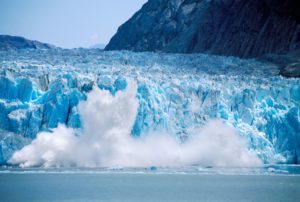
Our Planet Has Lost Over 28 Trillion Tons Of Ice Because Of Global Warming In Less Than 30 Years
The battle against global warming is a long one.
In recent data that was released to the public, it showed that our planet has lost 28 trillion tons of ice in just the last 30 years.
28 trillion tons of ice, yes you read that right, over 28 trillion tons!
The ice of our planet has been under threat from global warming for years now, and with rising greenhouse emissions, more and more ice is melting.
Temperatures are getting hotter and sea levels are rising as a result of ice melting.
In the recent research, which was conducted in Greenland, scientists from the UK unveiled that our planet has lost 28 trillion tons of ice since 1994.
Researchers, who are from the Leeds and Edinburgh universities, as well as University College London, analyzed satellite imagery of glaciers, poles, and mountains that were caught on cam in the past 26 years.
They looked at data and resources to see the level of melting our planet has endured, and as a result, they came up with numbers that shocked almost everyone.
Professor Andy Shepherd, director of Leeds University’s Centre for Polar Observation and Modelling, said:
In the past researchers have studied individual areas – such as the Antarctic or Greenland – where ice is melting. But this is the first time anyone has looked at all the ice that is disappearing from the entire planet. What we have found has stunned us.
Due to melting glaciers and ice sheets all over the world, scientists said that sea levels could rise up to 1 meter by the end of this century.
This does match the predictions that were made by the Intergovernmental Panel on Climate Change.
Professor Shepherd added:
To put that in context, every centimetre of sea level rise means about a million people will be displaced from their low-lying homelands.
Due to the level of ice melting, the capability of our planet in reflecting solar radiation back to space will lower down too.
When our planet’s ice melts, ice will absorb more heat, which will result in more melting, more greenhouse gas emissions, and will contribute to further climate change.
Tom Slater, from Leeds University, said:
To put the losses we’ve already experienced into context, 28 trillion tonnes of ice would cover the entire surface of the UK with a sheet of frozen water that is 100 metres thick. It’s just mind-blowing.
This does not only affect sea levels and rising temperatures on our planet but because of no mountain range ice, local communities near glaciers are at risk of losing their source of fresh water.
Between 1980 and 1989, our planet’s temperature have risen by 0.14C. this is an increase of .2C in subsequent decades.
AIR encourages everyone who reads this to please do your part in tackling climate change.
Here are some of the things you can do:
- Use energy wisely
- Get charged up with renewables
- Eat more meat-free meals
- Buy organic and local when possible
- Do not waste food
- Grow your own food if possible
- Take public transit as much as you can
- Ride a bike if traveling locally
- Advocate for bike lanes
- Car-share with other people
- Consume less and waste less
- Invest in renewables and try to stay away from fossil fuels